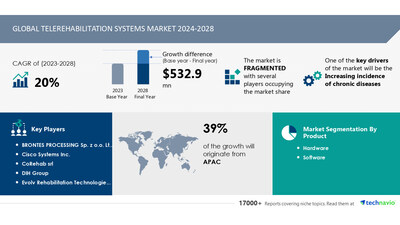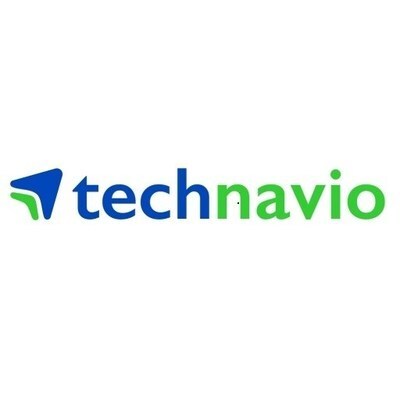Telerehabilitation Systems Market to Expand by USD 532.9 Million (2024-2028), Driven by Chronic Disease Rise and AI Influence - Technavio
NEW YORK, Oct. 16, 2024 /PRNewswire/ -- Report on how AI is redefining market landscape- The global telerehabilitation systems market size is estimated to grow by USD 532.9 million from 2024-2028, according to Technavio. The market is estimated to grow at a CAGR of 20% during the forecast period. Increasing incidence of chronic diseases is driving market growth, with a trend towards advent of advanced technologies. However, complexities in implementation of internet connection poses a challenge. Key market players include BRONTES PROCESSING Sp. Z o.o. Ltd, Cisco Systems Inc., CoRehab srl, DIH Group, Evolv Rehabilitation Technologies SL, GestureTek Health, Hinge Health Inc., Honeywell International Inc., Jitrnonix, KineQuantum SAS, Kineto Tech Rehab SRL, Koninklijke Philips N.V., LiteGait, MindMaze SA, MIRA Rehab Ltd., NeoRehab, Rehametrics, Robert Bosch GmbH, SWORD Health Technologies Inc., and Tyromotion GmbH.
Key insights into market evolution with AI-powered analysis. Explore trends, segmentation, and growth drivers- View the snapshot of this report
Telerehabilitation Systems Market Scope |
|
Report Coverage |
Details |
Base year |
2023 |
Historic period |
2018 - 2022 |
Forecast period |
2024-2028 |
Growth momentum & CAGR |
Accelerate at a CAGR of 20% |
Market growth 2024-2028 |
USD 532.9 million |
Market structure |
Fragmented |
YoY growth 2022-2023 (%) |
16.2 |
Regional analysis |
North America, Europe, APAC, South America, and Middle East and Africa |
Performing market contribution |
APAC at 39% |
Key countries |
US, China, Germany, Canada, and France |
Key companies profiled |
BRONTES PROCESSING Sp. Z o.o. Ltd, Cisco Systems Inc., CoRehab srl, DIH Group, Evolv Rehabilitation Technologies SL, GestureTek Health, Hinge Health Inc., Honeywell International Inc., Jitrnonix, KineQuantum SAS, Kineto Tech Rehab SRL, Koninklijke Philips N.V., LiteGait, MindMaze SA, MIRA Rehab Ltd., NeoRehab, Rehametrics, Robert Bosch GmbH, SWORD Health Technologies Inc., and Tyromotion GmbH |
Market Driver
The integration of advanced technologies like machine learning, predictive analytics, blockchain, big data, IoT, augmented reality, and virtual reality in telehealth solutions, including telerehabilitation, is expected to boost their adoption during the forecast period. The healthcare industry's implementation of Industry 4.0 technologies, such as sensors, IoT, AI, augmented reality, and virtual reality, is driving operational efficiencies and strategic advantages. With the use of Industry 4.0, healthcare companies can effectively monitor patients in real-time and provide treatment remotely. Virtual reality systems in healthcare processes offer connectivity, enabling data collection and generating insights via IIoT. These factors will create significant opportunities for the global telerehabilitation systems market.
The Telerehabilitation Systems Market is experiencing significant growth due to telemedicine policy reforms and the integration of AI technology. Patients value the convenience and accessibility of remote rehabilitation services, leading to high patient satisfaction. Telehealth policies support the use of software and hardware, including virtual reality, motion sensors, and telecommunication technologies, in orthopedic applications, physical therapy, speech-language therapy, occupational therapy, audiology, and psychology. Rehabilitation specialists can now provide real-time assessment and therapy in homecare settings and healthcare facilities. The aging and geriatric population's increased need for healthcare access is driving the market forward. However, concerns regarding data infringement and the need for reliable internet and telecommunication networks remain challenges for healthcare providers. Overall, telerehabilitation and e-rehabilitation services offer promising solutions for improving patient outcomes and expanding access to rehabilitation services.
Request Sample of our comprehensive report now to stay ahead in the AI-driven market evolution!
Market Challenges
- Telerehabilitation systems offer numerous benefits for healthcare organizations and patients, enabling remote therapy sessions and monitoring. However, a reliable Internet connection is essential for their successful implementation. Rural hospitals, characterized by limited workforce and resources, face challenges in adopting telerehabilitation due to the absence of dependable Internet connections. Internet service providers find it unprofitable to expand into rural areas due to the low number of users and high installation costs. This situation limits telerehabilitation access for rural residents, potentially hindering market growth during the forecast period.
- The Telerehabilitation market is witnessing significant growth due to the increasing prevalence of disorders such as traumatic brain injury, cerebrovascular accidents, and chronic conditions like osteoarthritis and drug or alcohol addiction. Digital technologies, including smartphones and the internet, have made telerehabilitation more accessible. However, challenges persist in providing clinical therapy, behavioral therapy, neurological therapy, and cognitive rehabilitation for the pediatric population. Healthcare costs and digital health technologies pose obstacles, but remote patient monitoring, tele physiotherapy, and e-visits offer cost-effective solutions. Rehabilitation professionals use software segments like Rehametrics, fitness programs, and telehealth technology for engagement and continuity of care. Telecommunication infrastructure, video conferencing, mobile applications, and wearable devices enhance patient-centric care. Security of health data and insurance coverage are crucial considerations. Artificial Intelligence is revolutionizing telerehabilitation, with solutions like VERA offering personalized treatment plans.
Discover how AI is revolutionizing market trends- Get your access now!
This telerehabilitation systems market report extensively covers market segmentation by
- Product
- 1.1 Hardware
- 1.2 Software
- Type
- 2.1 Physical therapy
- 2.2 Occupational therapy
- 2.3 Others
- Geography
- 3.1 North America
- 3.2 Europe
- 3.3 APAC
- 3.4 South America
- 3.5 Middle East and Africa
1.1 Hardware- The global telerehabilitation systems market is primarily driven by the hardware segment, which includes head-mounted displays (HMDs), sensor motion tracking systems, and haptic devices. HMDs create a parallax effect, enabling the brain to perceive depth. Sensors, integrated with gyroscopes and accelerometers, detect body movement, providing sensory data for software inputs. Hardware demands higher initial investments but offers superior performance. The rising need for advanced rehabilitation platforms for occupational and physical therapy, as well as robot-assisted rehabilitation, fuels hardware segment growth. Vendors provide home and center-based solutions for post-COVID patients with mild to moderate disabilities, requiring frequent monitoring and social distancing. Telerehabilitation's convenience and safety make it an ideal response in the post-acute COVID phase.
Download a Sample of our comprehensive report today to discover how AI-driven innovations are reshaping competitive dynamics
Research Analysis
Telerehabilitation, also known as e-rehabilitation, refers to the delivery of rehabilitation services using telecommunication networks, particularly the internet. This digital health technology enables medical professionals to provide diagnosis, therapy, and consultation remotely for various rehabilitation needs, including physical therapy, speech-language therapy, occupational therapy, audiology, and more. The telerehabilitation market continues to grow as telecommunication infrastructure advances, enabling remote healthcare services for individuals with chronic conditions and diseases, as well as for the aging and geriatric population. Telehealth services utilize video conferencing, mobile applications, and wearable devices for virtual consultation and remote monitoring. Digital health technologies, such as software and telecommunication technologies, play a crucial role in the delivery of these services. Telerehabilitation applications extend to orthopedic and homecare settings, expanding healthcare access and improving patient outcomes.
Market Research Overview
Telerehabilitation, also known as e-rehabilitation, refers to the delivery of rehabilitation services through telecommunication networks, including the internet. This innovative approach allows medical professionals to provide diagnosis, therapy, and clinical assessment to patients remotely, using digital technologies such as video conferencing, mobile applications, and wearable devices. Therapy modalities include physical therapy, speech-language therapy, occupational therapy, audiology, psychology, and more. Disorders treated range from traumatic brain injury and cerebrovascular accidents to pediatric population, drug and alcohol addiction, osteoarthritis, and chronic conditions. Digital health technologies, including smartphones, internet penetration, and telehealth policies, have driven the growth of this market. Rehabilitation professionals use software and hardware, such as Rehametrics and VERA, to deliver clinical therapy, behavioral therapy, neurological therapy, and cognitive rehabilitation. Telehealth services have become increasingly important for remote patient monitoring, e-visits, and virtual consultation in homecare settings. Telecommunication infrastructure, patient engagement, continuity of care, and patient-centric care are key considerations in the telerehabilitation market. Health data security, insurance coverage, and telemedicine policy reforms are also important factors. Artificial Intelligence (AI) and virtual reality are emerging trends in telerehabilitation, offering new possibilities for patient outcomes and healthcare accessibility. The aging population and geriatric population are major beneficiaries of telerehabilitation, as it enables remote monitoring and virtual consultation in the homecare setting.
Table of Contents:
1 Executive Summary
2 Market Landscape
3 Market Sizing
4 Historic Market Size
5 Five Forces Analysis
6 Market Segmentation
- Product
- Hardware
- Software
- Type
- Physical Therapy
- Occupational Therapy
- Others
- Geography
- North America
- Europe
- APAC
- South America
- Middle East And Africa
7 Customer Landscape
8 Geographic Landscape
9 Drivers, Challenges, and Trends
10 Company Landscape
11 Company Analysis
12 Appendix
About Technavio
Technavio is a leading global technology research and advisory company. Their research and analysis focuses on emerging market trends and provides actionable insights to help businesses identify market opportunities and develop effective strategies to optimize their market positions.
With over 500 specialized analysts, Technavio's report library consists of more than 17,000 reports and counting, covering 800 technologies, spanning across 50 countries. Their client base consists of enterprises of all sizes, including more than 100 Fortune 500 companies. This growing client base relies on Technavio's comprehensive coverage, extensive research, and actionable market insights to identify opportunities in existing and potential markets and assess their competitive positions within changing market scenarios.
Contacts
Technavio Research
Jesse Maida
Media & Marketing Executive
US: +1 844 364 1100
UK: +44 203 893 3200
Email: media@technavio.com
Website: www.technavio.com/
![]() View original content to download multimedia:https://www.prnewswire.com/news-releases/telerehabilitation-systems-market-to-expand-by-usd-532-9-million-2024-2028-driven-by-chronic-disease-rise-and-ai-influence---technavio-302276802.html
View original content to download multimedia:https://www.prnewswire.com/news-releases/telerehabilitation-systems-market-to-expand-by-usd-532-9-million-2024-2028-driven-by-chronic-disease-rise-and-ai-influence---technavio-302276802.html
SOURCE Technavio

 Index Options
Index Options CME Group
CME Group Nasdaq
Nasdaq Cboe
Cboe TradingView
TradingView Wall Street Journal
Wall Street Journal
